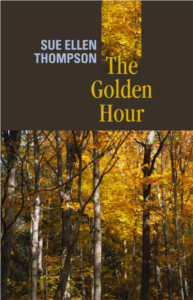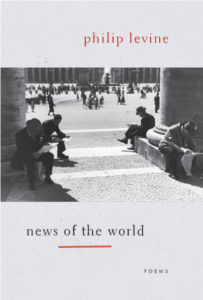Spring 2012
Table of Contents - Vol. VIII, No. 1
Poetry Fiction Translations Essays Reviews
Barrett Warner
Sue Ellen Thompson,
The Golden Hour, ISBN 978-1932870107, Autumn House, 2006, 88 pages, $14.95.
Sometimes wounded fruit tastes the best. This would be true of persimmons. Our native varieties are so bitter they need to be frost damaged to get your mouth on them. The hurt in Sue Ellen Thompson’s Pulitzer nominated The Golden Hour is her mother’s rapid decline and death from stomach cancer. It’s interesting to read Thompson in relation to Gregory Orr. His defining moment—shooting his brother—came before he was a writer. Thompson’s came long after she was already an accomplished poet. The Bread Loaf Fellow had previously published The Leaving, New and Selected Poems, along with two other collections, and was the editor of The Autumn House Anthology of Contemporary American Poetry.
When her mother learns of her diagnosis Thompson has already mucked up one marriage “to a depressive,” and her daughter has discovered that she is a transgendered male heterosexual. Thompson questions her own qualities as a mother and a partner. Getting close to her mother was a way to get some last lessons in how to keep a “tidy well-lit house.”
The Golden Hour is a collage of last letters about her parents, her mother dealing with her death and her father caring for the wife who had made his trains run on time for fifty years. These are feathered with Thompson’s poems about her own lack of an earnest partner and her not coping very strongly with life’s transient, but essential, elements. At weddings she’s always falling for someone else’s groom. An early poem, “Happiness,” has the evocative lines “You spread me on a mattress/ thinly buttered by a sheet,” but concludes this is “why people cry at weddings, isn’t it? Because/ the happy couple’s happiness is something/ we have all been lofted by.” The closing poem, “Blue Blanket,” reprises this horizontal setting. Her father “argued with her in their bed/ at naptime.” He tugs the blanket “tangled/ in her mother’s wasted limbs”
without knocking, freed the blanket
trapped between my mother’s knees and shook
it out once, high above
their bodies’ cursive. It floated
for a moment, blue as the Italian sky
into which my father flew his bombs
in 1943, blue as the hat I’d bought for her
for the winter she would never live
to see...the blanket
sifted down on them like earth.”
Some are poems of great connection which link the separate experiences of Thompson and her mother. Both had the pleasure of outrageous crushes on their doctors. Entering the examination room and seeing her new English doctor, Thompson is unable to undress fast enough. In “A Second Opinion,” her mother’s handsome doctor “rubbed his thumb against the current of her racing pulse.”
will take your life, he said, to which
my mother murmured Yes
in the rapt and breathless way
that women have when men who are beyond
their wildest dreams decide to pay
them some attention.”
The lessons in these poems are subtle, but poignant. Afraid of loss?—“Don’t you worry your pretty little head.” Many of these poems inveigle us to treat failure, personal and physical, with dignity and to relish the absurdities of life. Thompson never met an embarrassment she didn’t like, but she wisely stops just short of a breakthrough revelation. If these were 9/11 poems, they would take us from the early sacking of Istanbul all the way to Logan Airport. Thompson lets us guess the rest so that each poem becomes partially our poem.
In “My Father Gets His Wish,” her mother “said when his birthday comes I should buy him a recliner.”
continuing without her, and she wanted
them to be just like the old ones, but
blessed by everything to which she’d been
an obstacle.”
This reflection sets horses free so to speak, but while Thompson has enough insight to see this she doesn’t step any closer to the abyss where all of us are standing and consider the ways in which her own life has been an obstacle to others. Readers be advised: this is art after all, and not group therapy. Even the hurt, so real in its conception, is just a metaphor.
Part of Thompson’s restraint is her form. Some thirty-five of the sixty-one poems are sonnets. More than one of these leaves us wishing sonnets had a few more lines. Fourteen kisses just aren’t enough for these lips. We’d rather have a thousand. Still, these poems find ways to stop us cold. I was slain by lines such as “a young girl raised her violin and released a flock of sparrows” and “the sun dropping into its coin box.” In “Letting Go” Thompson makes a fast, dark drive to be with her mother as she died, “great gulps of highway disappearing down the station wagon’s open throat.”
One of my favorites was “Orthodontist Days.”
wouldn't speak to me or read a magazine,
she’d sit there with her baseball cap pulled low
over her forehead and a fist jammed tight
in either armpit, feigning sleep, although one sneaker
never ceased its restless motion.”
Each of us has been that ball cap and that fist and that restless sneaker. Each of us has been completely unable to talk with someone we love or just share a space with. Sometimes we’re the ones feigning sleep. This is Thompson’s gift, telling her story with so much room for the reader to come inside and take a pew.
Philip Levine,
News of the World, ISBN-13: 978-0375711909, Knopf, 2009, 80 pages, $16.00.
“Waiting on the Wind, Catching a Scent of Salt, Calling it Life”
The Motor City won’t stop making headlines. The government’s bailout of Detroit auto makers is only the beginning. Even the Library of Congress is getting involved. Philip Levine’s recent appointment as the nation’s Port Laureate is the latest huggy-smooch for the city that began as a fur trading post in New France.
This embrace is long overdue. Levine, 83, has twenty books of social justice poems in his mochila. His work champions the working lower and middle classes and immigrant families that shape America. While his cousins the folk singers play music that can only be listened to, Levine writes his poetry for the hip. It can also be danced. His rhythm in a poem gives his subjects an extra reach. Levine puts the horizon right in our grasp. “Take it,” he seems to say, “Your art, your life, it’s yours.”
Levine’s last published collection,News of the World, appeared in 2009. It will now be remembered as the book that flew him to his newest job, ambassador to the muses and leader of the free verse. Not surprisingly, the book encompasses the poet’s full life as if each moment in time were a whole century rolling about, stirring itself to rise.
Some believe we can only know something exists if it has a name. Writers use all sorts of tricks for coming up with names for characters. Some troll graveyards for ideas. Others might thumb the White Pages. Levine evidently doesn’t have a phone book. His poems prove what exists which hasn’t a name, whether it’s a relative, or a class of people, or a form of terrible injustice so nuanced it seems hardly perceptible.
There are only three names among the 32 poems in his collection, and one of these was Henry Ford, who was both person and corporation. In News of the World, Levine isn’t writing the biography of the nameless or the anonymous. Rather, he shows himself to be master of the silhouette portrait, drawing not the nude model but the shadow her profile creates. In most poems, that drawing that gives us no place to breathe, no stanza breaks which give the reader a resting area, and no names which let us get familiar, which let us “know” the “some things” and “some ones” in his work. Although we cannot breathe, Levine has done such a good job that we do not suffocate. In fact, we find we don’t even need oxygen at all, so rapt are we by eternities within the poem.
We can fill it with careful rooms and fill the rooms
with things—tables, chairs, cupboards, drawers
closed to hide tiny beds where children once slept
or big drawers that yawn open to reveal
precisely folded garments washed half to death
unsoiled, stale, and waiting to be worn out.
There must be a kitchen, and the kitchen must have a stove...
This poem, “A Story,” is about a house without a soul. Levine only makes references to a soul that once existed represented by the mother, children, and the father “with his right hand raised against the sky.” The house is only one house among rows and rows of houses “as far as sight,/and where sight vanishes into nothing.” And none of these houses have souls. “A Story” is about poetry itself, wherein each house is some fabricated piece of verse, poetry without soul because it enlivens no essential spirit within. It’s a strike against perfectly crafted poetry that isn’t moving. The poem’s opening lines are suggestive: “We can fill it with careful images and fill the images with words.”
Matters of soul are very much on Levine’s mind. In “New Years Eve, In Hospital” the narrator watches Apple drop so to speak with young priest who is perhaps there to offer Last Rites:
the shingle, draws back, swims up
again; it goes on night and day
all your life, and when your life
is over it’s still going.
The narrator dreads eternity, the soul-less eternity that we are all reminded of the closer we get to “slipping gracelessly from our lives.” As people we cannot embrace the very thing we cannot be and so the ways we go about destroying natural eternities are misguided attempts at making ourselves last longer, even if we lose our souls, our art.
In “Before the War”:
sometime in the last century, though
it could be Buffalo or Flint,
the places are the same except
for the names. At eight or nine,
even at eleven, kids are the same,
without any identity, without a soul,
things with bad teeth and bad clothes.
What is our soul? It is identity itself. What is our identity? It is something for which we must be old enough to have lived it into existence. It also helps if there’s music around the joint. Toledo, though, Buffalo, soul, clothes are bass line notes for the melody (city, century, kids) to play against with a nice measure of repetition or chorus (without and without, bad and bad).
Levine’s business of space being any space and time being any time rings out in most of the poems in the first two sections of the book. “My fathers, the Baltic” has a nice pair of bookends, the opening and closing couplets: “Low and gray, the sky/ sinks into the sea” and “the waves go out/ and nothing comes back.” Another poem, “Yakov,” begins with a kind of vastness and narrows itself all the way down to a “thin plume”--which also means feather—of smoke and silence, and later, “the music of silence.”
in the forest, his house for years—
thirty-five or more—he’d lost count.
From miles off descending into
the valley as evening gathered
in the branches of larch and oak
he’d catch the smell of wood smoke,
the thin plume that always brought
him home. “The silence, it was
all, it was everything.”
In Section II, Levine becomes a little more political. There’s a malevolent air surrounding misadventures of the industrial age and over-development of anonymous, soul-less sprawl. “I loved the world/ with its little woods that held/ their darkness and still ponds// clear as ice, that held the stars/ each night until dawn broke/ into fenced plots of land,/ claimed and named, barns and stables/ white houses with eyes shut tight/ against the intrusion of sight.”
Naturally, by this point there’s been enough zombie architecture we might be a little suspicious about a poem titled “Homecoming” and Levine does not disappoint. “It’s where the old house/ once stood, its wide eyes open day and night,/ replaced by nothing.” The ending of this poem is transformative:
that stood here, a shade is raised
to let the day in…If we’re quiet
we might hear something alive
on the move through the dusty alleys
or the little abandoned parks, some-
thing left behind, the spirit of the place
welcoming us. If the place had a spirit.”
The poems in this book are startlingly true and much more than I would have ever predicted. Sections III and IV push the music along (“Fixing the Foot: On Rhythm” and “The Music of Time”) and Levine, who has spent so much of his time here giving us poems about Hell, takes the moment to give us some poems about Heaven as represented by Barcelona, an industrial focal point in northeastern Spain. This is where his mother told him he was from, making up the story so his schoolmates wouldn’t know he was Russian. Spain has had a special place in Levine’s heart ever since. In Barcelona—Picasso’s birthplace—a distinct language (Catalan) is spoken, and the small industrial region sits relative to the larger Iberian culture the way Scotland does, say, to London. It is this unique identity, personal and cultural, which gives soul to buildings, most clearly those of Gaudi’s design, but especially to the language, the poetry, where soul is put back into words and the poem thus springs alive from the page: “the message comes translated/ into the language of water and wind,/ decipherable, exact, unforgettable, the same/ words we spoke before we spoke words.”
Other laureates have tried to impress us by editing daily verse anthologies, or writing newspaper columns on behalf of poetry. Levine has said his goal is to put poetry on the radio. Highbrow, silk hankie academics tend to smirk about spoken word and street poetry. It’s no wonder the man who lifts the poorer of us in his poetry will now try to raise the lesser lights of art. Maybe academics have the polish, “the careful images” filled with words, but Levine means to enliven us with spirit in many forms. Add some web graphics, a traffic lane for skateboarders, and you’ve got a revolution.
© Barrett Warner


